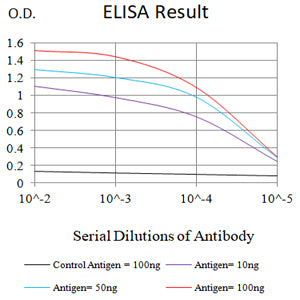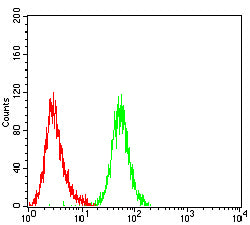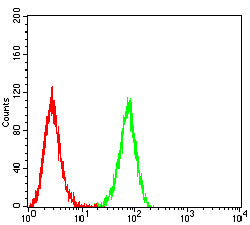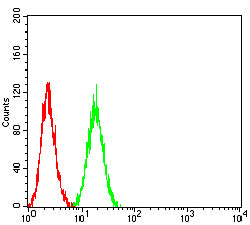



| WB | 咨询技术 | Human,Mouse,Rat |
| IF | 咨询技术 | Human,Mouse,Rat |
| IHC | 咨询技术 | Human,Mouse,Rat |
| ICC | 技术咨询 | Human,Mouse,Rat |
| FCM | 1/200 - 1/400 | Human,Mouse,Rat |
| Elisa | 1/10000 | Human,Mouse,Rat |
| Aliases | FCGR2B;CD32; FCG2; CD32B; FCGR2; IGFR2; FCGR2C; FcRII-c |
| Entrez GeneID | 2213 |
| clone | 2G6A7 |
| WB Predicted band size | 34kDa |
| Host/Isotype | Mouse IgG1 |
| Antibody Type | Primary antibody |
| Storage | Store at 4°C short term. Aliquot and store at -20°C long term. Avoid freeze/thaw cycles. |
| Species Reactivity | Human |
| Immunogen | Purified recombinant fragment of human CD32B (AA: 43-217) expressed in E. Coli. |
| Formulation | Purified antibody in PBS with 0.05% sodium azide |
+ +
以下是关于CD32B(FcγRIIB)抗体的3篇代表性文献及其摘要内容:
---
1. **文献名称**:*FcγRIIB regulation of B cell receptor signalling*
**作者**:Ravetch, J.V., et al.
**摘要**:该研究揭示了CD32B(FcγRIIB)通过抑制B细胞受体(BCR)信号通路调控体液免疫反应的机制,提出其在自身免疫疾病中作为关键负调节因子的作用,为靶向CD32B的抗体疗法提供了理论基础。
2. **文献名称**:*Targeting CD32B for selective depletion of autoantibody-producing cells in SLE*
**作者**:Bruhns, P., et al.
**摘要**:研究团队开发了一种特异性靶向CD32B的单克隆抗体,通过诱导自身反应性B细胞的凋亡,显著减少系统性红斑狼疮(SLE)模型中的致病性抗体水平,展示了其在自身免疫病治疗中的潜力。
3. **文献名称**:*Combination therapy with anti-CD32B and anti-CD20 enhances tumor clearance in lymphoma models*
**作者**:Dahan, R., et al.
**摘要**:该文献报道了联合使用抗CD32B抗体与抗CD20抗体(如利妥昔单抗)可协同增强抗体依赖性细胞毒性(ADCC),显著提高B细胞淋巴瘤小鼠模型的肿瘤清除效率,提示其在癌症免疫治疗中的应用价值。
---
以上文献涵盖了CD32B的基础机制研究、自身免疫疾病治疗和肿瘤免疫治疗方向,均为该领域的标志性研究。如需具体文献来源(期刊、年份等),可进一步补充关键词进行检索。
CD32B (also known as FcγRIIB) is a member of the Fc gamma receptor family, primarily expressed on B cells, dendritic cells, macrophages, and other immune cells. As the sole inhibitory Fcγ receptor in humans, it contains an immunoreceptor tyrosine-based inhibitory motif (ITIM) in its cytoplasmic domain, enabling it to suppress immune activation signals. CD32B binds the Fc region of IgG immune complexes, modulating immune responses by balancing activating signals from other Fc receptors (e.g., FcγRI, FcγRIIA, FcγRIII). This regulation is critical for preventing hyperactivation in autoimmune diseases and maintaining immune tolerance.
Therapeutically, CD32B has gained attention as a target in autoimmune disorders and cancer. In autoimmunity, enhancing CD32B signaling may dampen pathogenic antibody-driven inflammation. Conversely, in oncology, blocking CD32B on tumor-associated macrophages or B cells can enhance the efficacy of monoclonal antibody therapies (e.g., rituximab) by preventing inhibitory signaling that compromises antibody-dependent cellular cytotoxicity (ADCC) or phagocytosis. Recent studies also explore its role in modulating checkpoint inhibitor responses.
Despite its potential, targeting CD32B remains challenging due to its overlapping expression with activating receptors and the need for cell-specific modulation. Ongoing research focuses on developing agonistic/antagonistic antibodies or engineered Fc domains to fine-tune CD32B activity, aiming to optimize therapeutic outcomes while minimizing off-target effects.
×